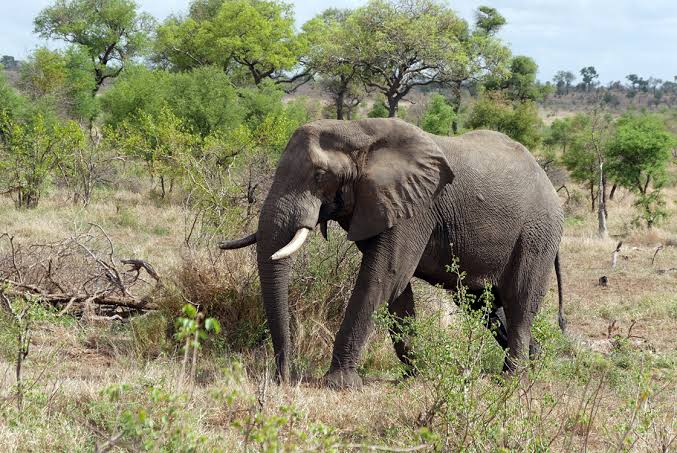TAITA TAVETA, Kenya, May, 7 – The government has cited climate change as a key threat to wildlife conservation efforts in the country after a disclosure that a record 78 elephants succumbed to the ravaging drought that swept through the Tsavo Conservation Area in 2021.
The Cabinet Secretary (CS) for Tourism and Wildlife Najib Balala said adverse effects of climate change have cascaded into the conservation sector and thereby presenting a significant challenge to the gains made by the government in the preservation of wildlife in protected and non-protected areas.
Speaking at Kenya Wildlife Service (KWS) Law Enforcement Academy in Manyani, Voi during the passing out of 68 community rangers from sixteen conservancies across the country, the CS said the government had put robust measures in place to mitigate against such risks.
“We are losing more elephants to climate change-related issues than to poaching. This new threat to conservation efforts is being handled through investing heavily in programs and processes that will sustain our wildlife heritage,” he said.
The CS was accompanied by the Principal Secretary (PS) Wildlife Zainabu Hussein, Chair of KWS Board of Trustees General (Rtd) Joseph Kibwana, KWS Director-General Brigadier (Rtd) John Waweru, Wildlife Secretary Dr. Erastus Kanga, and Taita-Taveta County Commissioner Lyford Kibaara amongst other senior officials.
The CS paid tribute to extensive anti-poaching efforts that have seen the elimination of poaching activities and illegal trade involving wildlife trophies. He however said that the new threat posed by climate change was equally severe because it impacted directly the survival of wild animals.
Already, several interventions are underway to secure wildlife in Tsavo National Park against drought. The CS disclosed that 13 water pans would be constructed at strategic areas inside the protected area. This will bolster activities towards harvesting rain and floodwaters.
The project would see thousands of elephants across the expansive landscape get water during the dry seasons.
According to the National Census Wildlife Report of 2021, Kenya has a population of 36,280 elephants. Tsavo Conservation Area has the highest concentration of elephants estimated at almost 13,000.
There have also been extensive reforestation efforts in several parts of Tsavo landscape that had been greatly affected by degradation. This is intended to restore the tree cover and increase the capacity of the protected area to retain moisture.
The CS stated that the next frontier in conservation called for close partnerships and collaboration with conservation partners to ensure that the emerging threats and challenges were effectively handled.
He added that the graduation of the rangers through the support of UNDP and partners was a testament to KWS’s commitment to work closely with groups to promote the growth of the wildlife sector and seek sustainable initiatives for the benefit of communities.
The CS reiterated the government’s efforts to protect the integrity of the conservation sector, warning that not doing so was risking the country losing an invaluable national heritage.
“We are committed to putting resources and efforts in ensuring the conservation sector grows through collaboration and strategic investments,” he said.
Already, KWS is in the process of overhauling its training curriculum to align with the changing dynamics in the conservation field. This change of curriculum has been necessitated by the need to build competencies that will enhance capacities for emergent challenges.
KWS Director General Brigadier (rtd) John Waweru said the changes in the curriculum remain key to enhancing the capacity of the Law Enforcement Academy to equip conservancies’ rangers and scouts with modern skills to boost conservation initiatives.
He added that the key pillars in KWS’s strategic plans including collaboration, conservation, and enterprise would be strengthened by the envisaged changes.
“The aim is to strengthen conservation through collaborations with partners and conservancies whom we work closely with,” he said.
KWS Board chair, General (rtd) Kibwana said the board would strive to support programs and plans that will steer growth and sustainability in the sector. Kibwana, who was on his first official duty since he was gazetted as the board chair, expressed confidence that the agency would continue spearheading growth in the conservation sector.
“The board will support programs and help in guiding the efforts to promote conservation,” he said.
As part of achieving the strategic objective of demystifying conservation to Kenyans, the CS said plans were underway to construct a multi-million Wildlife boot camp at Law Enforcement Academy grounds.
The boot camp with barracks for boarding will be a nexus for inducting students and residents into conservation activities as part of a participatory approach to conservation. The camp would also admit international students to create networks that will market Kenya as a key tourist destination.
Balala disclosed that such plans would form part of post-Covid 19 recovery strategies. He added that though tourism was hard hit by the coronavirus pandemic, the outlook in the post-covid era was very promising.
He predicted that 2022 might be the best year in the tourism sector and said projections indicated it might surpass the sh. 157 billion revenue from the sector in 2019.
“We estimate that we will fully recover from the effects of Covid-19 in 2024 but the outlook is very positive currently. If we keep on the current trajectory, we will surpass the revenues in 2019,” he said.
The country earned sh. 137 billion from the tourism sector in 2021.
Want to send us a story? Contact Shahidi News Tel: +254115512797 (Mobile & WhatsApp)


